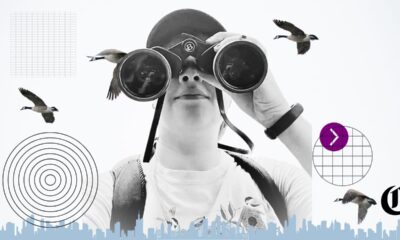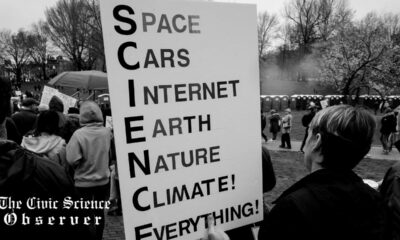Changemakers Program
Coming Home: The Journey of a Puerto Rican Scientist
Dr. Mónica Feliú-Mójer heads home to Puerto Rico to explore how culture, community, and identity have shaped her work as a scientist and science communicator.
For the ASL interpreted version, please head here
For Educators: Access free teaching resources at https://sciencecommunicationlab.org/science-videos/monica-feliu-mojer/
The film is included in the CivicSciTV Changemakers program with prior permission from Dr. Mónica Feliú-Mójer.
About the Film
“Coming Home” is a short documentary following Dr. Mónica Feliú-Mójer as she returns to Puerto Rico to serve as the emcee of the national conference of the Society for Advancement of Chicanos/Hispanics and Native Americans in Science (SACNAS). The film showcases her upbringing in a rural working class community and how it instilled values of equity, justice, solidarity, and collective care that drive her science communication and engagement work today.
About Dr. Mónica Feliú Mójer
Mónica is a bilingual science communicator who taps into her science PhD training, personal background, and culture (a woman from a rural working-class community in Puerto Rico) to engage historically underserved and overlooked audiences with science. As Director of Inclusive Science Communication for the Science Communication Lab, she produces short films that challenge deficit narratives about scientists of color and from marginalized backgrounds and creates courses to support the professional development of scientists. Dr. Feliú-Mójer also serves as Director of Public Engagement with Science for Ciencia Puerto Rico. She is a fellow of the American Association for the Advancement of Science and serves on the National Academies of Science, Engineering and Medicine’s Standing Committee on Advancing Science Communication. Website: https://www.monicafeliu.com/
About the Science Communication Lab
We are a non-profit organization of scientists and filmmakers collaborating on documentaries in order to build a more scientifically-engaged society. Find out more at https://sciencecommunicationlab.org/
Film Summary
The short-film traces the inspiring journey of Dr. Mónica Feliú-Mójer (who directed and produced the film) from her childhood in rural Puerto Rico to becoming a scientist and science communicator. As a child, Mónica was fascinated by nature and learned from Don Franco, an elder in her community who had an intimate understanding of the natural world, despite not finishing elementary school. Reflecting on him, she says, “I didn’t know it then, but Don Franco was the first scientist I ever met.”
Though Mónica loved science, she never thought she could be a scientist until her college biology professor encouraged her to try research. After just one month in the lab, she says, “I was hooked.” She went on to conduct research at MIT and Harvard but struggled to adjust to life in Boston, including the weather, city life, and language. “I suddenly had to translate everything I said or wrote into English,” she recalls, adding that she felt as though she also had to translate who she was.
Dr. Feliú-Mójer’s career took a transformative turn when she met Daniel Colón Ramos, a fellow Puerto Rican who had started an online community dedicated to connecting people interested in science and Puerto Rico. “Looking back, the serendipity of meeting Daniel changed my life forever,” Mónica reflects. She eagerly volunteered and began writing about science for a Puerto Rican newspaper, discovering a new passion: “I learned that I love communicating science.”
As Mónica continued her work in science communication, she realized that her calling was not just in the lab but in creating spaces for others to engage with science—particularly those from historically excluded communities. Today, she focuses on reimagining how science can serve communities, working with Puerto Rican leaders to “change attitudes around vaccination, develop strategies for responding to misinformation, and build new foundations for mutual understanding.”
Her return to Puerto Rico feels like her journey has come “full circle.” Mónica no longer feels the need to translate her identity for others: “I no longer translate myself because I never should have.” She embraces her identity fully, saying, “I speak loud and with my hands. I hug and kiss people to say hello. Even strangers. Instead of suppressing my identities, I lead with them.”
At the 2022 SACNAS Conference, Mónica delivered a heartfelt speech, saying, “I am a scientist gracias a mi barrio, a mi gente. Thanks to my community and my people; their lessons guide me. They ground me. They are home.”
In summary, the short film beautifully captures the essence of Dr. Feliú-Mójer’s personal and professional journey in science, blending thought-provoking visuals with important moments of self-reflection. Fanuel Muindi notes that “the pacing of the film is just right, allowing viewers to hear about Mónica’s journey directly through her voice.” He adds, “In the end, the film tells a story about belonging, resilience, and the transformative power of civic science engagement. The story is for anyone who’s curious about the possibilities of integrating science with community engagement.”
The CS Media Lab is a Boston-anchored civic science news collective with local, national and global coverage on TV, digital print, and radio through CivicSciTV, CivicSciTimes, and CivicSciRadio. Programs include Questions of the Day, Changemakers, QuickTake, Consider This Next, Stories in Science, Sai Resident Collective and more.

-
Audio Studio1 month ago
“Reading it opened up a whole new world.” Kim Steele on building her company ‘Documentaries Don’t Work’
-
Civic Science Observer1 week ago
‘Science policy’ Google searches spiked in 2025. What does that mean?
-
Civic Science Observer1 month ago
Our developing civic science photojournalism experiment: Photos from 2025
-
Civic Science Observer1 month ago
Together again: Day 1 of the 2025 ASTC conference in black and white
Contact
Menu
Designed with WordPress

























